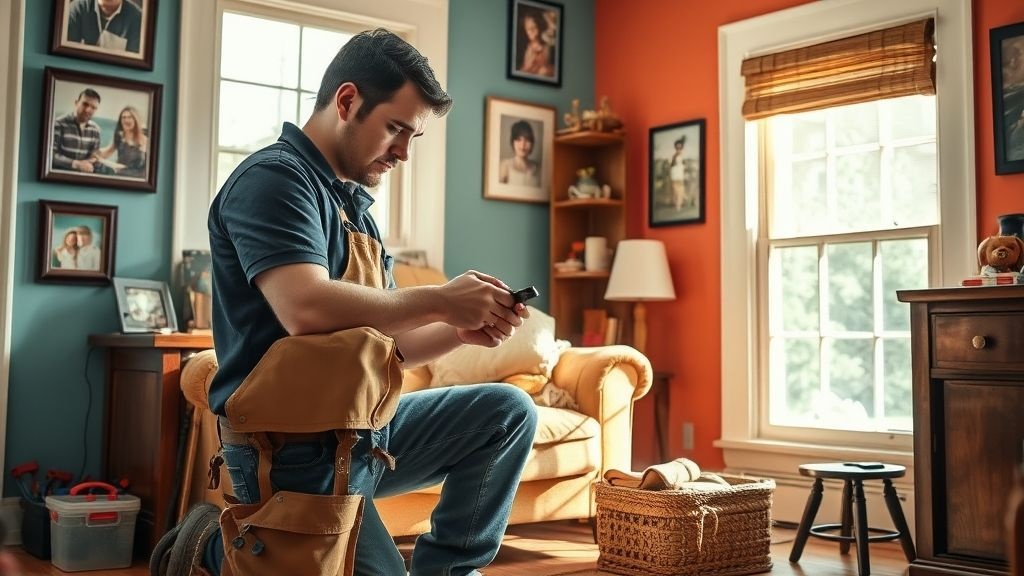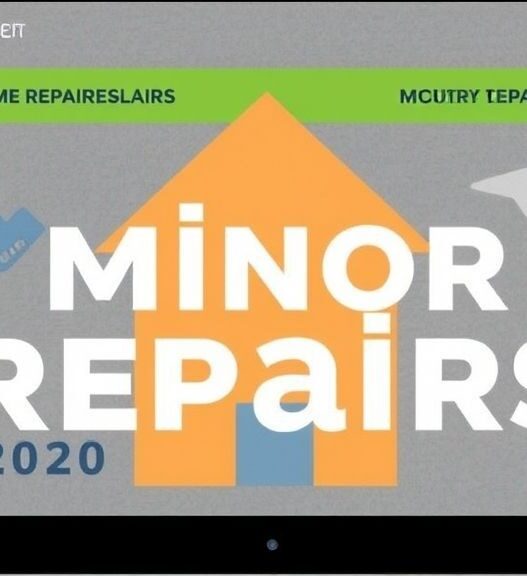Best Minor Repairs Guide Indianapolis: Proven Tips
Are you a homeowner in Indianapolis? Do you often face small household issues? Every home experiences wear and tear. Minor repairs are a common part of home ownership. Ignoring these small problems can lead to bigger, more expensive issues later. This guide will help you tackle common minor repairs with confidence. You can save money and keep your home in top shape. Learning basic minor repairs is a valuable skill for anyone. It helps maintain your property value. It also ensures your living space is comfortable and safe. This guide focuses on practical, proven tips for Indianapolis residents.
Introduction
Owning a home in Indianapolis brings many joys. It also comes with responsibilities. One key responsibility is keeping your home well-maintained. Small issues often pop up. These are known as minor repairs. They can include a dripping faucet or a small hole in the wall. You might have a squeaky door or a loose cabinet hinge. These problems seem small. However, they can worsen quickly if left unattended. Addressing minor repairs promptly saves you time and money. It prevents small problems from becoming major headaches. This guide provides practical advice. It helps Indianapolis homeowners handle common household fixes. You do not need to be a professional. You just need the right information. We will cover planning, costs, and step-by-step instructions. Get ready to become your own home repair hero.
Planning
Effective planning is crucial for any home project. This is true even for minor repairs. A little preparation goes a long way. It ensures you have the right tools. It also helps you understand the task ahead. Good planning prevents frustration. It also helps you avoid unnecessary trips to the hardware store. Before you start any minor repair, take a moment to plan. Think about what you need. Consider the steps involved. This approach makes the repair process smoother. It also increases your chances of success. Proper planning is the first step to a successful fix.
Key Considerations
- Identify the Problem Clearly: Understand exactly what needs fixing. Is it a leaky pipe or a loose tile? Pinpointing the issue helps you find the right solution. Take photos if needed. This helps when buying parts.
- Gather Necessary Tools and Materials: Make a list of everything you will need. This includes tools like screwdrivers or wrenches. It also includes materials like caulk or spackle. Check your toolbox first. Buy only what is missing. This saves time during the repair.
- Assess Your Skill Level: Be honest about what you can do. Some minor repairs are simple. Others might require more specific skills. Do not attempt complex tasks if you are unsure. It is okay to call a professional for bigger jobs.
- Research the Repair Process: Look up guides or videos online. Many minor repairs have simple instructions available. Understanding the steps beforehand builds confidence. It also helps you anticipate challenges. This research is vital for success.
- Prioritize Repairs: You might have several minor repairs pending. Decide which ones are most urgent. A leaky roof needs attention faster than a squeaky door. Prioritizing helps you manage your time effectively. It also prevents further damage.
Cost Analysis
Understanding the potential costs is important. This is true for any minor repair. Some fixes are very cheap. Others might require specific parts. Knowing the average prices helps you budget. It also helps you decide if DIY is truly cost-effective. Sometimes, hiring a professional is cheaper in the long run. This is especially true if you lack the right tools. Or if the repair is more complex than it first appears. Always compare prices for parts. Look at labor costs if you consider hiring help. This section helps you make informed financial decisions.
Price Comparison
Here is a general price comparison for common minor repairs in Indianapolis. These are estimates only. Actual costs may vary. Prices depend on the specific issue. They also depend on the quality of materials. Labor rates can differ between professionals. Always get multiple quotes for bigger jobs. This table provides a basic idea. It helps you budget for your minor repairs.
| Minor Repair Type | DIY Cost (Materials Only) | Professional Cost (Materials + Labor) |
|---|---|---|
| Leaky Faucet (Washer/Cartridge) | $5 – $30 | $75 – $200 |
| Small Drywall Patch (Hole up to 6 inches) | $10 – $40 | $100 – $300 |
| Squeaky Door Hinge | $2 – $10 (Lubricant) | $50 – $100 (If professional visit needed) |
| Running Toilet (Flapper/Fill Valve) | $15 – $40 | $80 – $250 |
| Loose Cabinet Hinge | $5 – $20 (New screws/hinges) | $60 – $150 |
| Clogged Drain (Sink/Tub) | $5 – $25 (Chemical cleaner/Plunger) | $100 – $350 (If professional snake needed) |
| Replacing a Light Switch/Outlet | $5 – $20 | $70 – $180 |
Remember, these are average costs for minor repairs. Complex issues will cost more. Always get a detailed quote. This is especially true for professional services in Indianapolis.
Step-by-Step Guide
This section provides detailed instructions. It covers common minor repairs. Follow these steps carefully. You can tackle many household issues yourself. Always prioritize safety. Turn off power or water if needed. Wear protective gear. These instructions are for typical situations. Your specific problem might vary slightly.
DIY Instructions
Let’s walk through some common minor repairs.
Fixing a Leaky Faucet
A dripping faucet wastes water. It also creates annoying noise.
1. Turn off the water supply. Find the shut-off valves under the sink. Turn them clockwise until tight.
2. Cover the drain. Use a cloth or stopper. This prevents small parts from falling.
3. Remove decorative caps. These are usually on the handle. Use a small screwdriver.
4. Unscrew the handle. You will see a screw underneath the cap.
5. Remove the packing nut. Use a wrench. This nut holds the stem in place.
6. Pull out the stem. The washer is at the bottom.
7. Replace the old washer. Take it to a hardware store. Buy an exact match.
8. Clean the area. Remove any mineral buildup.
9. Reassemble the faucet. Put all parts back in reverse order.
10. Turn on the water. Check for leaks. Your minor repair is complete.
Patching a Small Drywall Hole
Small holes are common. They are easy to fix.
1. Clean the area. Remove any loose debris.
2. Trim ragged edges. Use a utility knife. Make the hole neat.
3. Apply a mesh patch. Peel and stick it over the hole. Ensure it covers completely.
4. Apply joint compound. Use a putty knife. Spread a thin layer over the patch.
5. Let it dry. This takes a few hours. Check the product instructions.
6. Sand lightly. Use fine-grit sandpaper. Make the surface smooth.
7. Apply a second coat. Make it very thin. Feather the edges.
8. Let it dry again. Sand one more time.
9. Clean dust. Wipe the area with a damp cloth.
10. Prime and paint. Match your wall color. This minor repair blends perfectly.
Silencing a Squeaky Door
Squeaky doors are irritating. This is a very simple minor repair.
1. Open the door fully. This exposes the hinges.
2. Remove hinge pins. Use a hammer and nail. Tap the pin up from the bottom.
3. Clean the pins. Wipe off any dirt or rust.
4. Lubricate the pins. Use WD-40 or petroleum jelly. Coat them thoroughly.
5. Reinsert the pins. Tap them back into place.
6. Open and close the door. Check if the squeak is gone.
7. Repeat for all hinges. Sometimes all hinges need attention. This minor repair is quick.
Fixing a Running Toilet
A running toilet wastes a lot of water.
1. Remove the tank lid. Set it aside carefully.
2. Identify the problem. Is the flapper not sealing? Is the fill valve stuck?
3. Check the flapper. It is the rubber seal at the bottom. It might be old or warped.
4. Replace the flapper. Turn off the water supply to the toilet. Flush to empty the tank. Unhook the old flapper. Attach a new one.
5. Check the fill valve. This is the tall plastic tube. It controls water filling. Adjust the float if water level is too high.
6. Ensure chain length is correct. The flapper chain should have slight slack. Too tight, it stays open. Too loose, it gets caught.
7. Turn water back on. Test the flush. Listen for running water. This minor repair saves water.
Tightening a Loose Cabinet Hinge
Loose hinges make doors sag.
1. Open the cabinet door. Support it with one hand.
2. Inspect the screws. Are they stripped? Are they too short?
3. Tighten existing screws. Use a screwdriver. Turn clockwise until snug. Do not overtighten.
4. If screws are stripped: Remove the screw. Insert a wooden toothpick or matchstick into the hole. Break it off flush.
5. Reinsert the screw. The wood filler gives it new grip.
6. Replace hinges if damaged. Sometimes hinges bend or break. Buy new ones.
7. Align the door. Adjust the hinge screws for proper alignment. This minor repair improves appearance.
These detailed steps help you with common minor repairs. You can save money in Indianapolis.
Maintenance Tips
Regular maintenance prevents many minor repairs. A little effort now saves big problems later. Being proactive keeps your home in excellent condition. It also extends the life of your appliances and fixtures. Think of it as preventative care for your house. These tips are easy to follow. They do not require special tools. Incorporate them into your routine. Your home will thank you.
Long-Term Care
- Regularly Inspect for Leaks: Check under sinks and around toilets. Look for water stains on ceilings. Catching small leaks early prevents major water damage. This is a key part of preventing major minor repairs.
- Clean Drains Monthly: Pour a mixture of baking soda and vinegar down drains. Follow with hot water. This helps prevent clogs. It keeps pipes clear. This simple act avoids future minor repairs.
- Test Smoke and Carbon Monoxide Detectors: Do this monthly. Replace batteries annually. Ensure your family’s safety. This is not a minor repair, but vital maintenance.
- Check HVAC Filters: Replace or clean them every 1-3 months. Clean filters improve air quality. They also make your system more efficient. This prevents costly HVAC minor repairs.
- Inspect Exterior Annually: Look at your roof, gutters, and siding. Clear debris from gutters. Seal small cracks in siding. Address any issues before winter. This prevents weather-related minor repairs.
Conclusion
Tackling minor repairs yourself is empowering. It saves money. It also gives you a sense of accomplishment. This guide provided proven tips. You learned about planning, costs, and step-by-step instructions. We covered common issues like leaky faucets and drywall holes. Remember to always prioritize safety. Gather your tools before starting. Do not be afraid to research. Many resources are available online. Regular maintenance is also key. It prevents small problems from growing. By following these tips, you can keep your Indianapolis home in great shape. You will be ready for any minor repair that comes your way. Your home will be safer and more comfortable. You are now equipped to handle many household fixes.





















